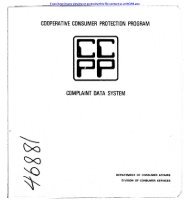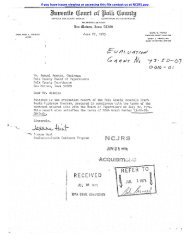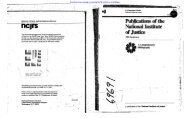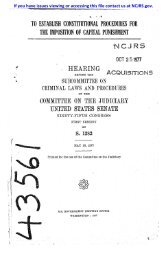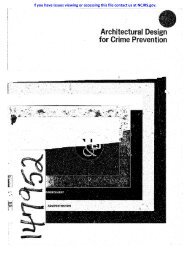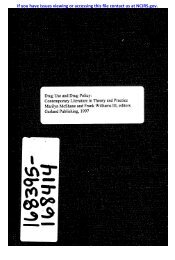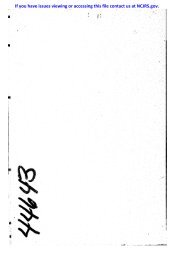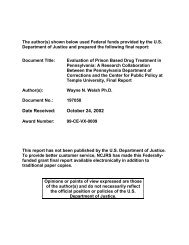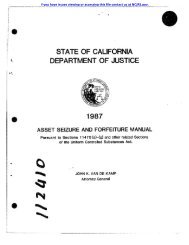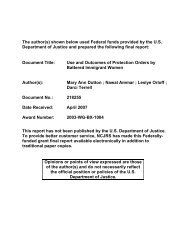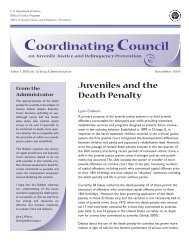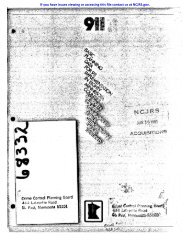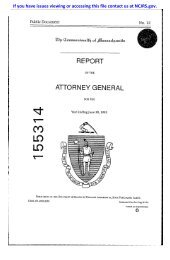Conflict Resolution Education - National Criminal Justice Reference ...
Conflict Resolution Education - National Criminal Justice Reference ...
Conflict Resolution Education - National Criminal Justice Reference ...
Create successful ePaper yourself
Turn your PDF publications into a flip-book with our unique Google optimized e-Paper software.
Key Teaching Strategies: Role-playing, case studies,<br />
games, performances, reading and writing<br />
assignments, videos, and classroom discussions.<br />
Type of Material: Teacher’s manuals, student<br />
activity books, and videos.<br />
Cost: Not available for purchase without first<br />
attending the Program for Young Negotiators’<br />
training seminar on negotiation.<br />
Peacemaking Skills for Little Kids, Pre K–K. 1993.<br />
Fran Schmidt and Alice Friedman.<br />
Peacemaking Skills for Little Kids, Grade One. 1996.<br />
Doris Berkell, Karen Kotzen, and Sandy Rizzo.<br />
Peacemaking Skills for Little Kids, Grade Two. 1996.<br />
Elyse Brunt, Alice Friedman, Fran Schmidt, and<br />
Theresa Solotoff.<br />
Peace Scholars: Learning Through Literature, Grade<br />
Three. 1996. Diane Carlebach.<br />
Peace <strong>Education</strong> Foundation, 1900 Biscayne<br />
Boulevard, Miami, FL 33132–1025.<br />
Phone: 800–749–8838<br />
Audience: Grades pre-K through 3.<br />
Focus: Peacemaking Skills for Little Kids, Pre K–K,<br />
teaches listening and communication skills, explores<br />
emotions, and stresses cooperation and cultural<br />
tolerance, introducing students to the I-Care Rules<br />
and the PEF’s conflict resolution model. Peacemaking<br />
Skills for Little Kids, Grade One, focuses on giving<br />
students a more indepth understanding of the I-Care<br />
Rules, stressing cooperative learning and reading,<br />
writing, and problem-solving skills. Peacemaking<br />
Skills for Little Kids, Grade Two, continues to build<br />
on the skills begun in the previous books, providing<br />
lessons and extension activities that can be incorporated<br />
into traditional academic subjects. Peace<br />
Scholars: Learning Through Literature, Grade Three,<br />
uses a collection of ethnically diverse stories and<br />
folk tales to enhance students’ conflict resolution<br />
competency and teach cooperation, self-esteem,<br />
empathy, and other life skills.<br />
Key Teaching Strategies: Puppetry, discussion,<br />
music, experiential learning, cooperative activities,<br />
role-playing.<br />
Type of Material: Teacher’s guide, student handbooks,<br />
poster, puppets, audiocassettes, and buttons.<br />
Cost: Complete set of materials for each title,<br />
$119.95; teacher’s guide including student pages,<br />
$23.95.<br />
B–7<br />
Time Out To Resolve It! A School-Based <strong>Conflict</strong><br />
<strong>Resolution</strong> Program. 1994. Citizenship & Law-<br />
Related <strong>Education</strong> Center, 9738 Lincoln Village<br />
Drive, Sacramento, CA 95827.<br />
Phone: 916–228–2322<br />
Audience: Grades K–12.<br />
Focus: To teach decisionmaking, problem-solving,<br />
and communication skills that help students resolve<br />
their own conflicts peacefully.<br />
Key Teaching Strategies: Individual, small- and<br />
large-group work, practice, and discussions; roleplaying;<br />
active, cooperative learning activities;<br />
performance-based assessment.<br />
Type of Material: Student and adult training manuals,<br />
implementation manual, classroom lesson plans<br />
linked to middle and high school subject matter, and<br />
videotapes.<br />
Cost: Currently available only in conjunction with<br />
training.<br />
TRIBE: <strong>Conflict</strong> <strong>Resolution</strong> Curriculum for Middle<br />
School. 1994. Dee Edelman, Copper Coggins,<br />
Debbie Rios, and Kathryn Liss, The Mediation<br />
Center, 189 College Street, Asheville, NC 28801.<br />
Phone: 704–251–6089<br />
Audience: Grades 6–8.<br />
Focus: To reduce violence and promote cooperative<br />
problem solving through win/win strategies, anger<br />
management, and communication and decisionmaking<br />
skills.<br />
Key Teaching Strategies: Role-playing, cooperative<br />
learning, metaphorical activities, group dialog, and<br />
simulations.<br />
Type of Material: Sequential curriculums for grades<br />
6–8 and classroom poster.<br />
Cost: Teacher manual, $20; classroom poster, $8.<br />
Violence Intervention Curriculum for Families. 1996.<br />
Violence Intervention Curriculum for Juveniles. 1996.<br />
New Mexico Center for Dispute <strong>Resolution</strong>, 620<br />
Roma NW., Suite B, Albuquerque, NM 87102.<br />
Phone: 800–249–6884<br />
Audience: High-risk youth ages 12–18.<br />
Focus: To give youth strategies to control impulsive<br />
behaviors, manage personal behavior, make informed<br />
choices, and acknowledge the consequences<br />
of their own actions for themselves and for others.



